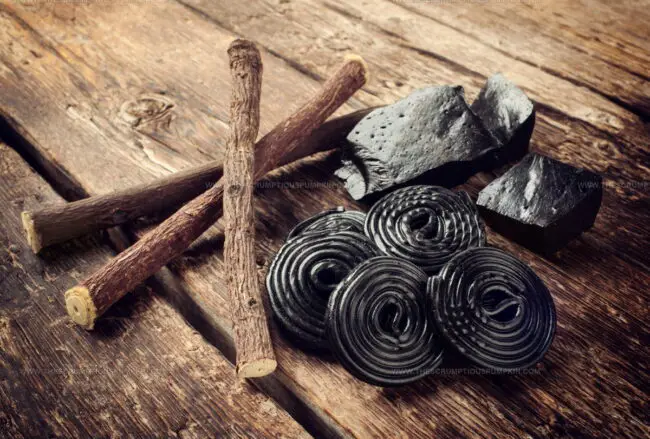What Does Black Licorice Taste Like? Uncovering This Bold Flavor
Black licorice flavor might surprise many people with its unique and polarizing characteristics.
This distinctive treat has roots in ancient cultures and continues to spark debates among food enthusiasts.
Some individuals adore its intense profile, while others find it completely unappealing.
Candy lovers often have strong opinions about this distinctive ingredient.
Regional preferences play a significant role in determining how people perceive its complex sensation.
Cultural backgrounds can dramatically influence one's appreciation for this distinctive confection.
Unraveling the mysteries behind black licorice's remarkable taste promises an intriguing culinary journey that will challenge your palate and expand your gastronomic understanding.
What Is Black Licorice?
Licorice snacks come from roots of licorice plants with a deep black color.
Sweet treats made from this ingredient show up in different styles across global regions.
Black licorice candies start with three key components.
Roots extract joins sugar and special binding agents.
Makers often choose starch, flour, gum arabic, or gelatin as base materials.
Some recipes include extra flavor boosters like beeswax, ammonium chloride, and sweet dark syrup.
Sugar mixes play a big role in creating licorice recipes.
Makers blend granulated sugar, dark corn syrup, condensed milk, and molasses.
Serious fans prefer blackstrap molasses for stronger taste.
Beginners might start with simple baking molasses for gentler flavor profiles.
The Flavor of Black Licorice
Black licorice contains complex flavor notes that mix sweet, bitter, salty, and sour sensations.
Chewing licorice reveals glycyrrhizin, a natural sweetener from licorice root that some compare to saccharin in Sweet n Low.
Its fragrant ester smells like anise or fennel, creating a rich and intense taste.
Black licorice reminds some of rootbeer, but with a much stronger flavor.
Many individuals dislike its strong anise and fennel-like profile.
Glycyrrhizin serves as the main ingredient in black licorice, similar to artificial sweeteners.
This compound provides temporary sweetness but carries potential health risks.
Short-term effects can include heart arrhythmias, lethargy, and potential heart complications.
Medical experts warn about consuming large quantities of licorice.
Individuals with kidney problems, liver conditions, or high blood pressure face increased health risks.
Healthy adults might enjoy black licorice without immediate concerns.
Licorice acts as an addictive candy that quickly sparks additional cravings.
Flavor profiles resemble vanilla, though not as sweet as many expect.
Diabetic individuals might find licorice an interesting taste experience.
Black licorice's sweetness stems from glycyrrhizin, a sugar-based component.
This ingredient can significantly impact potassium levels, potentially causing hypertension and heart rhythm disruptions.
Strong astringent properties contribute to its unique addictive quality.
Licorice enthusiasts should understand its complex flavor characteristics and potential health implications.
Why Black Licorice May Be Harmful
Sweet licorice root contains glycyrrhizin, a substance that might harm your health.
Medical experts warn about serious risks connected to this ingredient from licorice.
Glycyrrhizin can disrupt body chemistry in dangerous ways.
Blood pressure might spike, causing swelling and heart problems.
Electrolyte systems could become unstable, leading to serious medical complications.
Medicinal records show licorice has ancient roots across different cultures.
Glycyrrhetinic acid inside licorice triggers sodium retention, which creates significant health challenges.
Black licorice might trigger allergic reactions for some individuals.
Specific health conditions could make consuming this candy risky.
Sensitive stomachs could experience significant discomfort after eating licorice.
Gluten-sensitive bodies might also react badly to this sweet treat.
Symptoms could include:
Careful attention matters when considering licorice consumption.
Medical professionals recommend watching for warning signs and understanding personal health risks before eating this sweet snack.
Can Black Licorice Help With Weight Loss?
Licorice might slim down body fat and lower aldosterone without changing body mass index.
Research suggests licorice works by blocking a specific enzyme in fat cells while study participants maintained consistent calorie intake.
Licorice root holds a chemical named glycyrrhizin.
Anise offers a bitter taste and serves as a frequent glycyrrhizin source.
Glycyrrhizin also appears in multiple medicinal plants, such as black licorice.
Anise works as a natural treatment for different health conditions, though scientific proof remains limited.
Is Licorice Tea Like Black Licorice?
Known by names like sweet root tea or licorice tea, this drink carries a taste similar to black licorice with hints of anise and peppermint.
Roots of this plant come from Europe and Asia, where ancient Egyptians cherished its special flavor and health perks.
Licorice root tea has long been a key ingredient in candies and sweets.
Natural medicine suggests it might help with different health concerns like erectile challenges and heart issues.
Medical research points to possible benefits for digestive, dental, and skin wellness.
Black licorice stands apart from white licorice in its unique flavor profile.
Salt and strong anise notes define its taste.
Glycyrrhizin, a sugar compound, helps the tea cling to your tongue.
Sal ammoniac gives it a bitter undertone, similar to saccharin's distinct taste.
Possible Health Benefits of Black Licorice
Black licorice, made from the root of the licorice plant, has been valued for its unique flavor and possible health benefits. Modern studies are starting to support what many traditional remedies have claimed about this old-fashioned treat:




Mia Thompson
Pastry Chef & Content Creator
Expertise
Education
Portland Community College – Baking and Pastry Arts Program
Specialized in artisanal bread, seasonal desserts, and sustainable baking methods.
National University of Natural Medicine – Bachelor of Science in Nutrition (BScN)
Focused on “Food as Medicine” philosophy, with core threads in nutrition.
Mia’s love affair with baking began in her grandmother’s kitchen, where sneaking spoonfuls of batter first sparked her curiosity. She refined her skills through Portland Community College’s Baking and Pastry Arts Program and her expertise at the National University of Natural Medicine, earning a B.Sc. in Nutrition.
At The Scrumptious Pumpkin, Mia reimagines classics with effortless seasonal treats, healthier twists on old favorites, and playful confections that feel like pure joy. Beyond the oven, she nurtures her urban garden, forages local ingredients around Portland, and leads hands‑on nutrition workshops for her community.